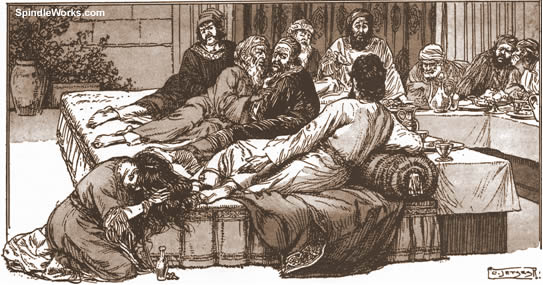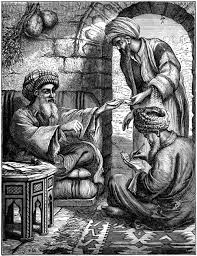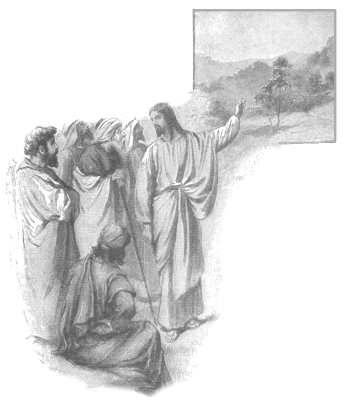google-site-verification: google85f203565cb16b4c.html
Making Better Thought-Movies One Truth At A Time
_________________________________
The Parable of the
Two Debtors

The Parable of the Two Debtors:
Luke 7.40-49 AMPLIFIED VERSION
"And Jesus, replying, said to him, Simon, I have something to say to you. And he answered, Teacher, say it.
41 A certain lender of money [at interest] had two debtors: one owed him five hundred denarii, and the other fifty.
42 When they had no means of paying, he freely forgave them both. Now which of them will love him more?
43 Simon answered, The one, I take it, for whom he forgave and cancelled more. And Jesus said to him, You have decided correctly.
44 Then turning toward the woman, He said to Simon, Do you see this woman? When I came into your house, you gave Me no water for My feet, but she has wet My feet with her tears and wiped them with her hair.
45 You gave Me no kiss, but she from the moment I came in has not ceased [intermittently] to kiss My feet tenderly and caressingly.
46 You did not anoint My head with [cheap, ordinary] oil, but she has anointed My feet with [costly, rare] perfume.
47 Therefore I tell you, her sins, many [as they are], are forgiven her—because she has loved much. But he who is forgiven little loves little.

The Two Debtors - Is Forgiveness on Display

Our personal reaction to the Two Debtors parable will very telling...
- Many people have a strong sense of needing GOD's forgiveness
- When that need is met through Jesus Christ, there is a bringing forth of certain emotions. Some of these may be a brokenness, weeping, joy, an overwhelming appreciation of being set free, a tenderness towards Christ the Savior and the Holy Spirit of GOD.
- These are natural emotional reactions for "forgiveness received!"
- To those who think they are good enough, the world system keeps rolling on, but this is a secret world of forgiveness which cannot easily be explained, only by experience does it become real. A man may say to his wife, "I know what it means to have a baby" - no, you don't - until you literally have a baby yourself - it is a separate world into which men cannot enter...
- The "world of forgiveness" can only be understood by those who have had a personal revelation of their own sinfulness, and deep need to have the burden of sin released and taken away.
I am deeply moved by the Two Debtors parable. The more I meditate on it, the more I see myself just as the "immoral woman" - and I have a weeping that comes into my spirit as I realize I am as guilty as her.
Casual observers of the two debtors parable have little idea of what is going on here - ALL they see is our past sin, which is correct - which we all see as well - but forgiveness washes that past away. That's the difference. The penalty of sin has been removed through the shed blood sacrifice of Jesus Christ.
If our reaction to the two debtors parable is negative - I would be worried. We need to see what sin is and what it controls in our lives, and our future. None of us escapes the truth of the two debtors parable...
The Parable of the Two Debtors:
We have to go back a few verses to understand the setting -
36 "One of the Pharisees asked Jesus to have dinner with him, so Jesus went to his home and sat down to eat.
- Jesus was dining at the home of Simon, the Pharisee
37 When a certain immoral woman from that city heard he was eating there, she brought a beautiful alabaster jar filled with expensive perfume.
38 Then she knelt behind him at his feet, weeping. Her tears fell on his feet, and she wiped them off with her hair. Then she kept kissing his feet and putting perfume on them.
- While Jesus was at Simon's house, Mary, shows up at the dinner
- Access to Simon's house was easy. The rules of Oriental hospitality allowed anyone to come and go while the meal was been served and enjoyed. Cushions were provided to lie on and converse with the guests of the home.
- The woman who shows up is described as "immoral" - and one who had such a reputation would have been the last person expected. But she had heard that Jesus was there, and she came to see and minister to Him. It did not matter if the house was owned by a Pharisee. She came only to display her gratefulness by the only way she knew how - to wash and anoint His feet.
39 When the Pharisee who had invited him saw this, he said to himself, “If this man were a prophet, he would know what kind of woman is touching him. She’s a sinner!”
40 Then Jesus answered his thoughts. “Simon,” he said to the Pharisee, “I have something to say to you.”
- See that statement in the two debtors parable - "Jesus answered his thoughts"
- Simon was having an ongoing conversation in his mind. If this is a true prophet, he would be able to discern this woman's character, and not allow her to touch him...
- This is so interesting... Simon is evaluating why Jesus is allowing this harlot to be at his feet, kissing them

“Go ahead, Teacher,” Simon replied.
41 Then Jesus told him this story: “A man loaned money to two people—500 pieces of silver to one and 50 pieces to the other.
- The man was a money-lender, a very kind and generous man
42 But neither of them could repay him, so he kindly forgave them both, canceling their debts. Who do you suppose loved him more after that?”
43 Simon answered, “I suppose the one for whom he canceled the larger debt.”
“That’s right,” Jesus said.
- Yes, Simon, you have answered correctly...
44 Then he turned to the woman and said to Simon, “Look at this woman kneeling here. When I entered your home, you didn’t offer me water to wash the dust from my feet, but she has washed them with her tears and wiped them with her hair.
45 You didn’t greet me with a kiss, but from the time I first came in, she has not stopped kissing my feet.
46 You neglected the courtesy of olive oil to my head, but she has anointed my feet with rare perfume.
47 “I tell you, her sins—and they are many—have been forgiven, so she has shown me much love. But a person who is forgiven little shows only little love.”
- The woman knew who she really was. She knew she was deeply guilty. She felt remorse for her sins, and had a conscious need of GOD's forgiveness. Mary felt an overwhelming sense of being in debt to GOD for His forgiveness and that translated into outward expressions of "love", "gratitude" and a desire to kiss His feet, weep tears - being fully aware of what the Holy Spirit had done in her life. Her conscious need of pardon was deeply personal and her reaction to the presence of Jesus reflected the depth of gratitude she felt...
- On the other hand, the Pharisee had NO sense of sinfulness, He had a pride of being self-righteous, and felt no need of forgiveness from GOD or anyone else. His opinion of himself made him blind to any need of repentance.
48 Then Jesus said to the woman, “Your sins are forgiven.”
- It appears that this woman had a previous forgiveness event because the words used are "Thy sins have been and remain forgiven."
49 The men at the table said among themselves, “Who is this man, that he goes around forgiving sins?”


|
Parables are powerful "word-pictures" that are meant to be engrafted into our thinking...as mental pictures do control our thought-life. That's where the "imagination" gets involved. The imagination allows mental exploration of the past, present, future. It is the ability to see pictures and images in the "movie theater" of the mind. The imagination is the "workshop" of the human mind. It is the only thing in the world we have complete control over. That's why GOD takes great interest of what goes on there, and judges what we allow to grow there - Genesis 6.5 |
 |
|

Simon, you did not give me a "kiss on the cheek" - a common sign of hospitality - but this woman kissed "my feet" - a token of total humility
Simon, you gave me no water to wash the dust off my feet - neglecting a customary act of hospitality - but she gave me "the water of her weeping, and tears"
Simon, usually a guest has cheap oil at their disposal while in your house - but she brought a very expensive perfume - and anointed my feet with it...
Mary was in your house, Simon, and she did the honors to your guests... and you thought I did not know how to recognize character - and who has it!
Simon, in his own eyes was too good to offer customary hospitality. He lacked any consciousness of sin... that's why the parable said that she has been forgiven much and he little.
They all criticized Mary. Her sin could not be condoned. Yet - she found forgiveness. She demonstrated the ongoing relationship between forgiveness and "love" that comes out of forgiveness.
Simon did not lack sin. But had no interest to explore any way out of his own self importance, self-righteousness and pride. He did not allow any connection with GOD's power of forgiveness and mercy. He wasn't interested. She was.
Making Better Thought-Movies One Truth At A Time
_________________________________
Bible Study Lessons
- Abandonment
- Abilities
- Abortion
- Abuse
- Addiction
- Accusations
- Adultery
- Anger
- Apathy
- Ashamed
- Attitudes
- Backsliding
- Betrayal
- Bitterness
- Born Again
- Chance
- Conscience
- Deceit
- Deception
- Discipline
- Discretion
- Eyes of GOD
- False Witness
- Fear of the Lord
- Fear -Lord #2
- Flattery
- Friendship
- Fool, A
- Foolishness
- Forgiveness
- Giving
- Inheritance
- Injustice
- Instruction
- Judgment
- Kindness
- Knowledge
- Lawlessness
- Lies, Lying
- Misunderstand
- Pleasure
- Pride
- Problems
- Soft Answers
- Speech
- Understanding
- Vengeance
- Wisdom

Parables by Jesus
- Children of Bridechamber
- New Patch, Old Garment
- New Wine, Old Wineskins
- Treasures Old and New
- Spontaneous Growth
- Mustard Seed
- The Leaven
- Hidden Treasure
- Pearl of Great Price
- Dragnet
- The Soils
- Children at Play
- Wise and Foolish Builders
- The Wheat and the Tares
- Empty House
- Uncompleted Tower
- Rash King's Warfare
- Chief Seats
- Pharisee and Publican
- Two Debtors
- Unmerciful Servant
- Barren Fig Tree
- Bond Servant
- Unjust Steward
- Rich Fool
- Rich Man and Beggar
- Good Samaritan
- Laborers and the Hours
- Friend at Midnight
- Importunate Widow
- Lost Sheep
- Lost Coin
- Prodigal Son
- Elder Brother
- Two Sons
- Cruel Vine-Dressers
- Rejected Cornerstone
- Great Feast
- Wedding Robe
- Wise and Foolish Virgins
- Talents
- Good Shepherd